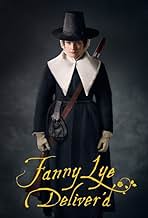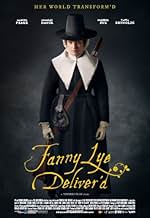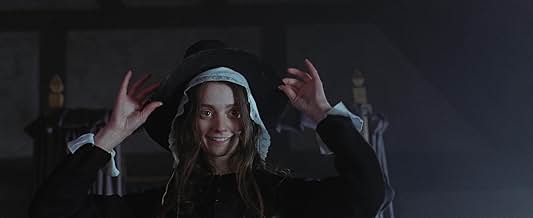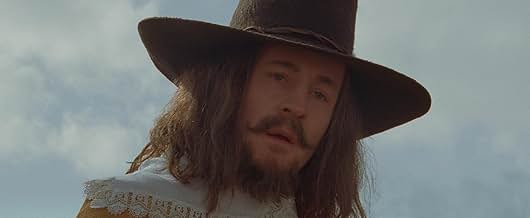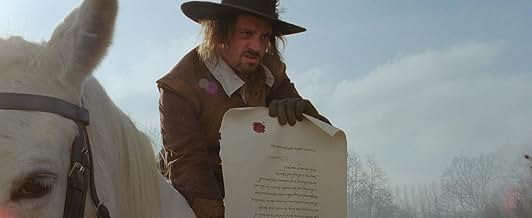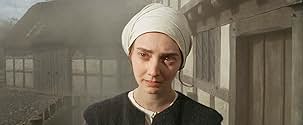IMDb RATING
6.2/10
2K
YOUR RATING
Fanny lives in an English farmhouse in 1657 when militant Puritans rule. Two fugitives with radical new ideas arrive. When the sheriff arrives, things deteriorate badly prompting Fanny to ma... Read allFanny lives in an English farmhouse in 1657 when militant Puritans rule. Two fugitives with radical new ideas arrive. When the sheriff arrives, things deteriorate badly prompting Fanny to make drastic decisions about her life.Fanny lives in an English farmhouse in 1657 when militant Puritans rule. Two fugitives with radical new ideas arrive. When the sheriff arrives, things deteriorate badly prompting Fanny to make drastic decisions about her life.
- Awards
- 1 win & 7 nominations total
- Director
- Writer
- All cast & crew
- Production, box office & more at IMDbPro
Featured reviews
... have a tough time establishing a base to grow as they are mistaken for heretics in 17th century England by Monty Python's Spanish Inquisition disguised as puritanical nutters - undeliver'd!
I was ready to turn this movie off. It's a period piece. Cromwell's in charge, the King was executed and a brutal war recently ended. I was bored. I would have rated it a 5, but the solid acting brought it up to 6.
About two thirds of the way through, there is a plot twist or two which were quite unexpected and gave the movie a bonus star. Try to stay until the credits run, as there is an epilogue which makes me now question if the movie was based on a real person.
About two thirds of the way through, there is a plot twist or two which were quite unexpected and gave the movie a bonus star. Try to stay until the credits run, as there is an epilogue which makes me now question if the movie was based on a real person.
Most of us anyway hunger for original films and one of the many positives of Fanny Lye Deliver'd, is that it truly is a movie based on original ideas. Fancy a Puritan western? A folk horror tale? Or just an extremely unusual period piece? Thomas Clay's Fanny might just be more than worthy of your attention. But having said that, I also have to admit I have mixed feelings about it and am disappointed that such a beautifully acted film, which spent 3 years in post production (almost unbelievable for such a clearly low budget production) didn't end up being a better product.
There is a lot to admire here, The film looks amazing: the costumes and production design are striking and the subdued colours, often viewed through mist, make many shots look almost like paintings. The small cast is excellent, especially Charles Dance, who gives his stern character some humanity, and Maxine Peak, who, as the titular character, gradually discovers there are other ways to live and is tempted by the possibilities. The occasional anachronistic-sounding piece of dialogue aside, there's a strong period feeling.
The narrative itself is compellingly interesting, especially for those with a genuine interest in the time of the singular English republic. The pace varies for sure, but the storyline could never be accused of being predictable. And the major characters of the admittedly, deliberately small cast are all engaging in their own ways.
So, the letdowns? Clay's score, added in the above - stated post production phase of course, is varied in its themes and instrumentation but does seem to be lathered on way too much and overall ends up feeling rather awkward. At times it seems as though the music is simply playing in the background with little or no relation to what's happening on screen. And the inclusion of an arrangement of the Ode to Joy from Beethoven's Ninth Symphony more than 150 years before the composer wrote it was another jarring anachronism, too familiar to be fully effective.
On top of this, the film builds to a climactic action set piece, which is filmed in virtual darkness. For about a minute and a half, we can't really see what's going on, only hear a multitude of sounds. It might make for a good radio play, but it doesn't make for good cinema. The light of day reveals what has occurred, but the feeling that much dramatic heft, has been expunged from our viewing, cannot be easily passed off. Again, I have to ask, why was this allowed to occur in a film so long in post production and editing? Surely it could have been remedied in some way. It also would appear that this scene, which really defines the "Deliver'd" aspect of the film's title should have appeared somewhat earlier in the film in order that we can discover how well Fanny Lye has been delivered of her previous life.
In concluding, FLD will undoubtedly please many punters looking for movies with original riffs. However it only achieves qualified success, due to some wayward directorial decisions, from its albeit, very creative writer - director.
There is a lot to admire here, The film looks amazing: the costumes and production design are striking and the subdued colours, often viewed through mist, make many shots look almost like paintings. The small cast is excellent, especially Charles Dance, who gives his stern character some humanity, and Maxine Peak, who, as the titular character, gradually discovers there are other ways to live and is tempted by the possibilities. The occasional anachronistic-sounding piece of dialogue aside, there's a strong period feeling.
The narrative itself is compellingly interesting, especially for those with a genuine interest in the time of the singular English republic. The pace varies for sure, but the storyline could never be accused of being predictable. And the major characters of the admittedly, deliberately small cast are all engaging in their own ways.
So, the letdowns? Clay's score, added in the above - stated post production phase of course, is varied in its themes and instrumentation but does seem to be lathered on way too much and overall ends up feeling rather awkward. At times it seems as though the music is simply playing in the background with little or no relation to what's happening on screen. And the inclusion of an arrangement of the Ode to Joy from Beethoven's Ninth Symphony more than 150 years before the composer wrote it was another jarring anachronism, too familiar to be fully effective.
On top of this, the film builds to a climactic action set piece, which is filmed in virtual darkness. For about a minute and a half, we can't really see what's going on, only hear a multitude of sounds. It might make for a good radio play, but it doesn't make for good cinema. The light of day reveals what has occurred, but the feeling that much dramatic heft, has been expunged from our viewing, cannot be easily passed off. Again, I have to ask, why was this allowed to occur in a film so long in post production and editing? Surely it could have been remedied in some way. It also would appear that this scene, which really defines the "Deliver'd" aspect of the film's title should have appeared somewhat earlier in the film in order that we can discover how well Fanny Lye has been delivered of her previous life.
In concluding, FLD will undoubtedly please many punters looking for movies with original riffs. However it only achieves qualified success, due to some wayward directorial decisions, from its albeit, very creative writer - director.
I attempt to watch all the historical films no matter how bad they are due to my love for history. I saw some articles about the films journey and struggles to get it filmed edited and released. I was hoping that the journey of making Fanny Lye was as good as the end product. It was! Though the story felt rushed at one small section, and the sheriff contrasts heavily with other characters, the film provides high historical accuracy in an area cinema has rarely covered. It was a blast to watch and the almost 2 hour runtime somehow felt way shorter. Fox provided such a vibrant cunning show and his chemistry on-screen with Charles Dance was something amazing!!!!
I can see where some reviews are coming from with negativity as the film is no where near the sort of expectations a historical film tells, no super ordinary humans, just a regular 1600s family. But this film deserves a chance to be watched and a chance for an open mind to experience an era that you will probably never watch or hear of for many years in the future.
If you live in a family that is quite strict, strangers coming from outside may feel like a welcome (pun intended) distraction. On the other hand, the father (wonderfully played here) may have the best interest in mind and heart, but his harsh and way too restricted views are not helping his wife or "kid".
The outlaws from outside really bring imbalance. Depending on your moral views, your sympathy may sway from one scene to the other. It is ok to feel, you are being given a tough choice. Morally speaking this isn't too easy - but that is what the movie gives you. Something to think about - something to chew on. And questions about what is good and what is bad, that go beyond religion and obvious answers.
Not sure why my previous comment got deleted, but while I had not saved it yet, I will park this somewhere just in case, someone feels the need to be mean - which would bring us to the characters: who is eventually the mean one? Who do you side with? Have you decided yet?
The outlaws from outside really bring imbalance. Depending on your moral views, your sympathy may sway from one scene to the other. It is ok to feel, you are being given a tough choice. Morally speaking this isn't too easy - but that is what the movie gives you. Something to think about - something to chew on. And questions about what is good and what is bad, that go beyond religion and obvious answers.
Not sure why my previous comment got deleted, but while I had not saved it yet, I will park this somewhere just in case, someone feels the need to be mean - which would bring us to the characters: who is eventually the mean one? Who do you side with? Have you decided yet?
Did you know
- TriviaThe local accent in Shropshire and eastern Powys of the time was not recognisably "Welsh" or "West Midlands" in the way that might be expected today.
- GoofsAmong the linguistic anachronisms in the script are the following: Pee - to urinate: Although an old expression, the Oxford English Dictionary states that the term didn't come about until the eighteenth century, the century after this film is set. Shrooms - mushrooms with psychedelic properties: The first recorded use of this term in print was in Australia in 1977 Mixed emotions - a mid-twentieth century term describing ambivalence. Bleed out - to die due to blood loss: A twentieth century term with its origins in the United States (it is suggested that it was originally military jargon). Lose the attitude - An instruction meaning don't be rude: A late twentieth century term with its origins in the US.
- Alternate versionsAlso exists in an Extended Cut, around 19 minutes longer than the Theatrical Cut, and currently only available through the film's 4K Ultra HD disc release in the UK. This version is the director's preferred version of the film.
- SoundtracksMarch to Joy
Written by Thomas Clay
Based on "Symphony No. 9" written by Ludwig van Beethoven
Heard as end theme
- How long is The Delivered?Powered by Alexa
Details
- Release date
- Countries of origin
- Official sites
- Language
- Also known as
- The Delivered
- Filming locations
- Production companies
- See more company credits at IMDbPro
Box office
- Gross worldwide
- $40,753
- Runtime1 hour 52 minutes
- Color
- Aspect ratio
- 2.39 : 1
Contribute to this page
Suggest an edit or add missing content





